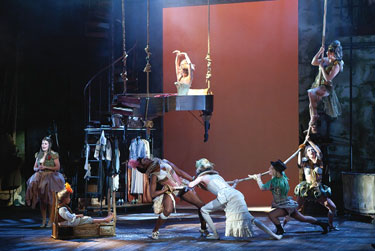Enchantingly atmospheric and often funny, the Shakespeare Theatre Company's A Midsummer Night's Dream is rich with love's intangibles: wistfulness, a touch of cynicism, and its contrast of flavors – the blindly new, the knowingly seasoned, and the always mysterious. Of course, much has been written on Shakespeare's references for this play – some medievally religious, some classical (see a very interesting article in the program notes) – but this is an interpretation that feels firmly rooted in the magic of human and not-so-human love. With fairies who look to have pulled their personas from a fabulous dress-up box, a slowly complex, twirling choreography, and a set evoking a crumbling between-wars European theater, this is a confection for those who prefer their holiday entertainment more pagan than pious.
And there is much subtle potency here in director Ethan McSweeny's contrast between the fairies, who emerge like vibrant echoes from another era, and the humans who, lit with incandescent-bulbed realism, stay thoroughly grounded in earthly concerns (both practical and passionate). The young humans live for the frantic moment, the older ones carry a burden of lost innocence and post-war fatigue, and the fairies come, go and interfere more for their own purposes than with any real interest in human need. Working equally well for the mingled habitats of the earthly and magical, Lee Savage's front and backstage sets are quirky and inventive (and reminiscent, in their quiet chaos, of Avant Bard's anarchic days in the Clark Street Theater), even if they never quite evoke a real or imagined fairy forest.

Midsummer Night's Dream
(Photo by Scott Suchman)
With three interwoven worlds at play -- a near-miss rom-com between four would-be human lovers; the comic efforts of an ad-hoc acting troupe to plan and perform an entertainment for the king's wedding; and a tempestuous fairy king and his queen whose feud soon sends troublesome magic into the lives of the wooing couples and actors alike – there is a lot to carry.
In the wrong hands, such of the bard's complexities can be tackled with an exaggeration that is a poor substitute for clarity. But McSweeny's vision for each world is clear and cohesive. His fairies are grown-ups and their plane a place of intense, well-crafted rhythms; they may be tantalizing but they are never Tinker Bell (Disney's, that is). Just as effectively, yet in an entirely different way, the ragtag acting troupe delivers wit, nuance and even palatable slapstick with their own vibrant color while the young couples rail, rant and woo with the unique energy of self-absorbed youth. Such distinct different moods and measurers all in one play are no mean feat. Indeed there is only one plate that falls – and only briefly – and that is when the actors finally perform for the king. The "bad" buffoonery lags until Bottom returns with his usual tongue-in-cheek energy. Still, those few moments aside, this large ensemble piece, moving from world to world and back again, works exceptionally well.
As fairy King Oberon and Queen Titania, Tim Campbell and Sara Topham have a convincing spark with one another, with Topham's self-absorbed, flirty independence and lithe limbs suggesting well why Oberon finds her both annoying and irresistible. That we get all of this from Titania speaks highly of Topham and, add her easy facility with the language, and she is a true standout. A bit menacing, a bit broody and, without doubt, a sizzler in his powder and wig, Campbell gives Oberon an equally potent personality. But, although he is largely fluent and has a memorable voice, there are words now and again that break rhythm in a way that distracts.
In the high profile role of Puck, Oberon's mischievous servant and the play's sometime narrator, Adam Green fits well with his serious master, giving his fairy a more determined than playful feel. Though this slight edge is an interesting take on Puck, the lack of an equal amount of charm brings, at times, a bit of chill.
Carrying the subplot of the four would-be lovers, Robert Beitzel, Amelia Pedlow, Christiana Clark and Chris Myers bring much earthly energy and humor to their nearly thwarted romances. Beitzel is a cleverly idiosyncratic Lysander, managing the bard's language through a comically modern prism and yet remaining quite convincing. As his paramour, Hermia, Pedlow brings an appealing and credible blend of innocence and intelligence, even if her diction could use a bit more crisping. Clark starts slowly and somewhat out of synch with the language, but as the emotional demands of the role increase, so do her fluency and expression, even if she never quite captures the pathos of Helena's rejection.
As Demetrius, the man who runs from and then to Helena, Myers offers much comic timing and is very much at home with the bard.
A MIDSUMMER NIGHT'S DREAM


 To Dec. 30 Harman Hall 610 F St. NW $43-$105 202-547-1122shakespearetheatre.org
To Dec. 30 Harman Hall 610 F St. NW $43-$105 202-547-1122shakespearetheatre.org
The so-called Mechanicals, otherwise the acting troupe, are a comic mix of male bodies, ages and abilities. High in subtle comedy is Ted van Griethuysen as Quince, who brings the perfect blend of hope and despair to his erstwhile "director." His comic opposite, but no less funny, is Bruce Dow's Bottom, the weaver turned high-octane thespian, whose first "rehearsal" almost steals the show. Though his encasing in the infamous donkey head via Puck's magic subdues much of his comic flair, Dow holds his own and makes a good foil to the besotted Titania. Another standout is David Graham Jones as Flute, whose "lady" does much to rescue the troupe's rather laborious performance for King Theseus (also played by Tim Campbell) and his new queen Hippolyta (given some interesting frisson by Sara Topham). Mastering Peter Pucci's effective choreography, the background fairies glide through more than a few moves, dances and acrobatics with much seamless grace.
A night of laughs and dreamy, sensuous magic, this Midsummer is much ''the best in this kind.''
...more